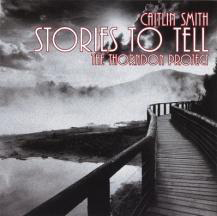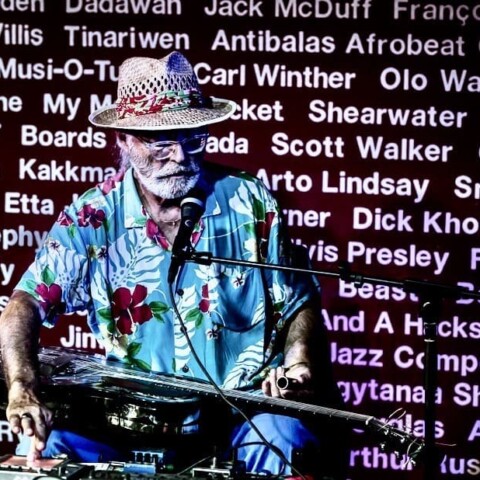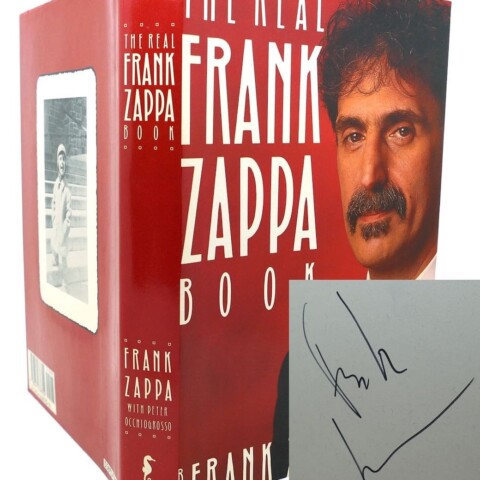 I GOT HALFWAY through listening to this album before I realised, while perusing the liner notes, that it was named after a project created by my late cousin-in-law, Gwen Nagel. It made my heart swell, and my eyes tear, to think how much Gwen – who gave up her fight against cancer in 2009 – would have loved to know that this recording had come about.
I GOT HALFWAY through listening to this album before I realised, while perusing the liner notes, that it was named after a project created by my late cousin-in-law, Gwen Nagel. It made my heart swell, and my eyes tear, to think how much Gwen – who gave up her fight against cancer in 2009 – would have loved to know that this recording had come about.
Gwen won a Queen’s Service Order for services to special education, specifically blind and vision-impaired students, and Stories To Tell (the album) takes its name from a dissertation on the experiences of blind children and their families; one that led to (according to the booklet) “an education delivery model for visually impaired children in New Zealand. This model is now a world leader in the education of blind and visually impaired students.”
Funded through PVINZ (Parents of Vision Impaired New Zealand) and the Office of Disability Issues, Stories To Tell features two legally blind musicians – singer Caitlin Smith and drummer Mark Lockett, along with sighted players Alan Brown (C3 organ) and Paul Van Ross (sax), peforming a nine-song, jazz-oriented set that took place one day in April.
 Expecting this rather ad hoc quickie to sound half-arsed, I was taken aback by the way the musicians grabbed the moment, turning it into something more than a souvenir, elevating it merely from simply one live-in-studio date. The sound itself may be less nurtured, cajoled and cultivated than that of a ‘proper’ studio album (apparently, Smith has one of those in the works), and the nature of the date means that the instrumentation on each song has the same sonic signature, but that’s no flaw.
Expecting this rather ad hoc quickie to sound half-arsed, I was taken aback by the way the musicians grabbed the moment, turning it into something more than a souvenir, elevating it merely from simply one live-in-studio date. The sound itself may be less nurtured, cajoled and cultivated than that of a ‘proper’ studio album (apparently, Smith has one of those in the works), and the nature of the date means that the instrumentation on each song has the same sonic signature, but that’s no flaw.
Lockett, Brown and Ross are impressive enough, and the one-take engagement with the material make for an enjoyable set, but it’s Caitlin Smith’s superb singing skills that tweak the listener’s ear. She truly is one of our outstanding vocalists, and her scatting improvisations give life even to Leonard Cohen’s ‘Hallelujah’, a song that I never thought I needed to hear again.
The album sounds good, too, although I would have liked Smith’s vocals to have been inched up a notch or two louder in the mix. GARY STEEL
Music = 3.5/5
Sound = 3.5/5

Caitlin Smith – Stories To Tell: The Thorndon Project (Ode) CD REVIEW
1 Comment
Leave a Reply
Latest from Music

From The Archives: Tony Levin
Thirty-one years ago, GARY STEEL spoke to bassist extraordinaire Tony Levin who was about to perform in NZ with his good mate Peter Gabriel.

From The Archives: Pacific voyager Mike Cooper
Twenty years ago, GARY STEEL interviewed fascinating Rome-based UK-born folk experimentalist Mike Cooper on one of his Pacific journeys. Here's that story followed by

How not to meet a famous rock star
In 1989, CHRIS BOURKE was in New York and went along to a Frank Zappa book launch on behalf of a friend back home.

World’s Worst Records: Damon Albarn’s Everyday Robots
MATT KELLY is surprised and shocked to find that without the collaborations that are his stock in trade Damon Albarn has a yawningly empty

NZ rock still… rocks! We Search For Yeti!
They probably won’t be performing at Spark Arena anytime soon, but GARY STEEL reckons Wellington-based independent rockers Search For Yeti are well worth a










Good afternoon Gary
Thank you for the review of the CD Stories to Tell. The CD idea was an after thought during the project in putting together the project and a concert featuring Caitlin Smith and Mark Lockett at Old St Pauls in late June.
There were many parents who worked closely with Gwen Nagel to develop the new model for the education of our kids. She was however the leader and driver on what is now a reality.
Our Stories to Tell booklet is available on our web site http://www.pvi.org .nz.
I am also copying below the address by Minister Tariana Turia, which was an inspirational moment.
Kind regards
David Heather
15 June 2013
Disability Awareness Campaign – Stories to Tell
Parents of Vision Impaired New Zealand, Project Thorndon
Hon Tariana Turia, Co-leader of the M?ori Party
Monday 10 June 2013; 5pm; Grand Hall, Parliament Buildings
My parliamentary colleagues; Paul Gibson our Disability Commissioner; Riripeti Paine, the Chair of Parents of Vision Impaired; Paul Manning, your Executive Officer; family, friends and tamariki/mokopuna.
Once upon a time…those magical words have captivated our children and given joy to both storyteller and listener for ever and a day.
Stories transport us to another time and place, on foreign shores or just around the corner. These stories grow in our heart and sit deep inside, waiting for the right moment, when like a little mouse peeking out from the corner, they are ready to face the world.
Today we are here to celebrate the stories that have been coaxed from the mouths of parents.
This project, Stories to Tell, represents the experiences from an organisation which encompasses over two thousand parents of blind or vision impaired children.
The project received support under the Think Differently campaign – one of the initiatives I am really proud of – an initiative which is driven by the challenge to promote positive perceptions of, and greater social awareness towards, disabled people.
In the 2013 Budget it was pleasing to be able to announce a further six million dollars invested into the Think Differently campaign.
And tonight, this event, represents all the promise and the possibility of that campaign. It reminds us of all the reasons why we need to tackle negative attitudes head on, to confront behaviours that limit opportunities.
One of the authors, Lee Rutene, gives voice to the aspiration that so many stories share, “In the future I want to own my house and control my own life. My advice for people like me is to be strong and do the best that you can, with what you have got, and don’t let anyone tell you different”.
This collection of stories starts, then, from that basis, and shares memories, and experiences that have shaped journeys both as parents and children.
The book provide glimpses into the lives of the everyday heroes who, in their own words, “try to face the reality of their child’s disability with determination and courage”.
Today marks the release of these stories into the world. Over the next fortnight, Parents of Vision Impaired intend to tell their stories to the Thorndon community as part of their campaign of awareness for and of their blind and visually impaired children.
The fabulous High Tea that forms the concept in this event is so fitting for the nature of the Thorndon Project. And this is where a sense of history is captured between the pages of this resource.
For over half a century the New Zealand Foundation of the Blind operated an office in Tinakori Road. Many a lifelong friendship was formed at the children’s Christmas Party held in the rose garden.
And it was in this part of town, that the Mayor of Thorndon was first elected in 1941 – a tradition which was carried on with annual contests for the mayoralty right up until 1985.
Apparently the crowning of the Mayor of Thorndon was a prestigious ceremony – complete with clowns, parades and a variety of bands. A modest fee was charged – just a penny to vote – and before long a sizeable fund was established. That fund – the Mayor of Thorndon Blind Kiddies Appeal – lives on today in funds and grants made to children right across Wellington.
In the opening page of the book, the rationale, then for the Thorndon Project is laid out. We are told, “parent support networks….survive on stories”.
The word, survive, is profound in its application.
For some – like Amanda –her story began in tragedy with the loss of her twin sister. Both girls were born with inherited retinoblastoma. Her story is entitled, ‘it’s not a fairytale – it’s our tale’.
The struggle for survival, in fact, resonates through many of the pages.
Joshua arrived in the world twelve weeks earlier than expected, fighting for his life from his first breath. His little feet were not much bigger than the wedding ring his proud parents wear. At one stage Christine and Nigel were told to prepare for his funeral. Hospital was the home away from home: appointments with orthopaedics, neurosurgery, ENT, hearing tests, eye tests, paediatricians.
But through it all Josh has continued to battle to stay here – and likewise his parents battle to give him the best that life can provide. He thrives in their cuddles, he bursts into laughter at a drop of a hat.
They say that laughter is the best medicine. And that is surely a common theme woven throughout all the tales.
Nico’s tale is a particular ripper. He’s enraptured with all the little things that any ten year old boy shares – the sound of a good fart, rolling a ball into the washing machine just to hear the hollow bang. And it’s in the uncanny ability that a blind child has to spot a McDonalds sign from two miles away. As his
parents say, “McDonalds …..helping the blind see since 1940” should become their corporate logo.
One of the most effective messages in the book, is that relayed to us by our proud MC for the night David, and his wife Rhonda Heather. Their story contrasts what they were told, and what has instead been the lesson of their life.
They were told ‘this kid has no hope, you don’t have to take him home he won’t live past thirty years”.
The purpose of a storyteller is not to tell you how to think, but to give you questions to think upon. And so we ponder, what might have happened if parents chose to believe the predictions of those with supposed authority. What might have happened to their child, to their family?
David and Rhonda chose, instead, to live by the Yes We Canphilosophy of life – and 44 years later their son learned to ride a bike at 23; he has completed the Otago Rail Trail twice on a tandem and has attended Outward Bound three times.
In other words, their family has done everything possible to turn the impossible into the everyday; and to fully embrace the challenges, successes and failures and important lessons in life.
When it comes down to it, perhaps that’s one of the greatest impacts of this project, Stories to Tell. Of course, throughout the stories are written many moments of frustration and confusion; days of despair and nights of anguish.
But as Kirsty Ferguson says in her memories, there is so much more.
There are plenty of giggles to share; and in every case the children exceed the expectations that all others have put upon them – that is except those closest and dearest to them who want nothing more for their children than the entire world.
And so it is in the words of the children, that I want to leave us tonight. Who better to honour the courage, the faith, the trust and the all enduring spirit of optimism that tell the stories of the parents of Vision Impaired?
The parents in this booklet – like so many parents of disabled children – are fiercely focused on what people can do, rather than what they can’t. They are indeed the champions of the philosophy our Government is advancing in the Enabling Good Lives approach.
And so, the last word goes to Kirsty, who sums up a message which could be and should be heard by every parent in this book:
“So to you, our mum and dad, we say thanks for the gift, the love and the journey.
And whilst the journey wasn’t as you’d probably hoped and dreamed for, you have climbed Mt Everest and further, not only for Richard, but through your drive and determination for the disability world.
Not an easy road, but one we wouldn’t have any other way; we have your fighting spirit and we thank you for your strength and role models. Here here to fighting spirits and interesting journeys”.
I want to thank you all for the privilege of being able to say, “I now declare Stories to Tell officially launched”.